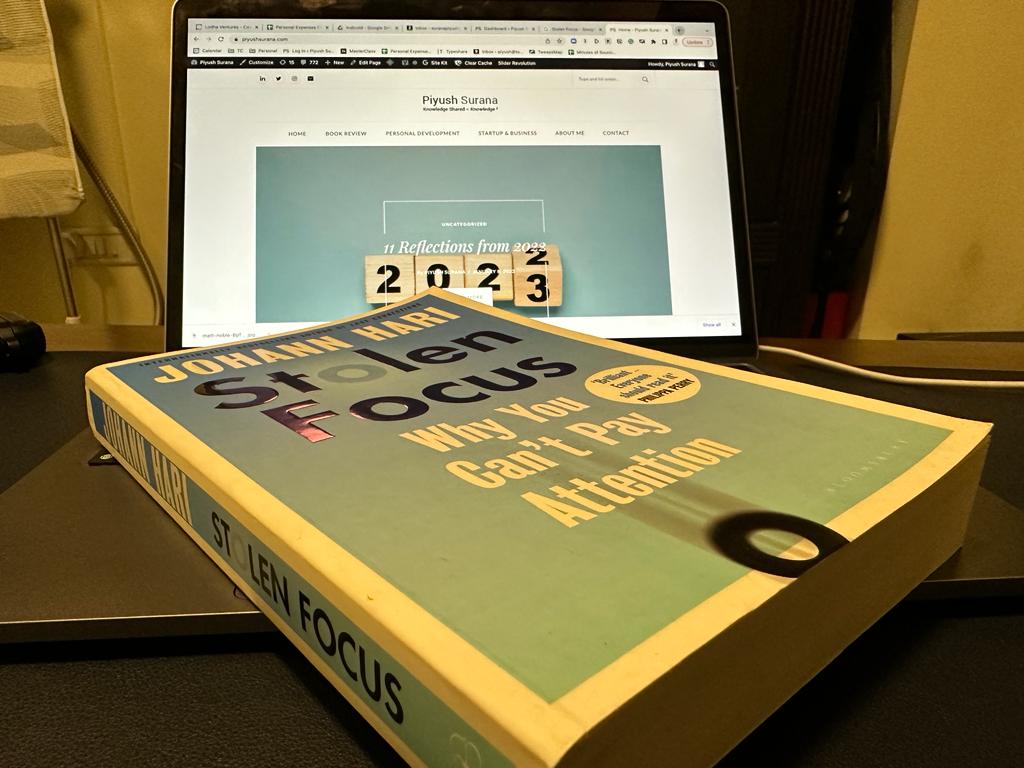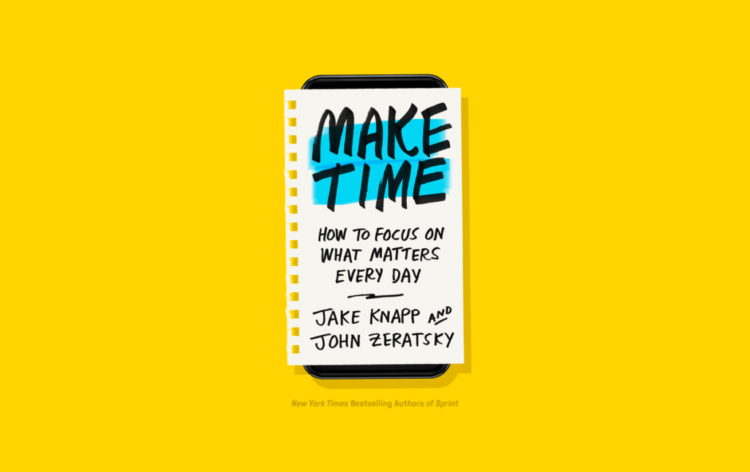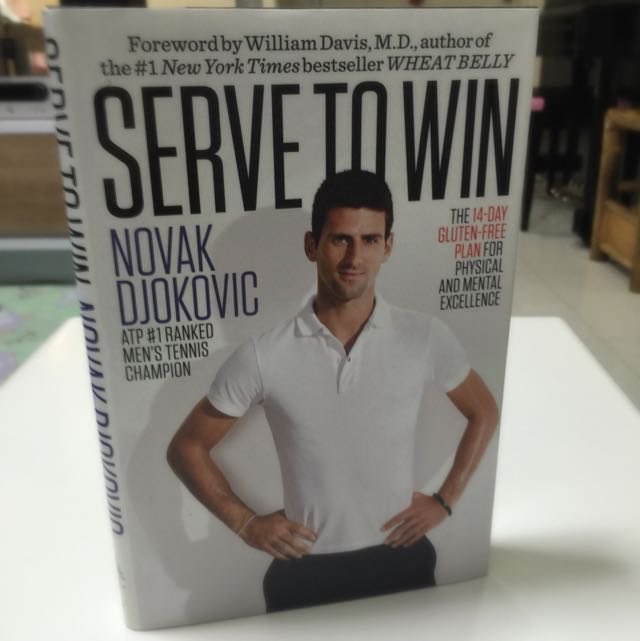“I wondered if the motto for our era should be: I tried to live, but I got distracted.”
Doing great work requires great focus. Shakespeare reportedly wrote for four hours in the morning, year after year. He produced almost a million words of content over 25 years. Thomas Edison is known to have worked straight for 60 hours when solving a particularly difficult problem. At one time, he claimed to have worked 20 hours a day for fifteen years. More recently, one of my favourite authors, Haruki Murakami, writes for 5-6 hours in the morning without any distractions, hardly ever varying his routine.
Compare this to normal work habits today. Research has shown that average students switch tasks every 65 seconds, an average office worker stays on one task for 3 minutes, and an average person touches the screen of their phone more than 2500 times a day!

Photo by Ryan Plomp on Unsplash
In office meetings, people focus more on their screens than on the topic. Almost all kids today eat their meals while looking at YouTube videos. And even something as social as dining together has become a more solitary process. Walk into a restaurant, and more than half the people are looking at their screens rather than the person across the table from them.
We all understand the value of unbroken, undistracted work. Or play. Or even conversations. But our daily life is so full of distracted, broken moments that feats of sustained and deep focus are increasingly hard to achieve. Stolen Focus by Johan Hari looks at various strands of research that affect our focus and then shares practical tips that can help you get more out of every day.
Not only does a lack of focus stop us from achieving our personal goals leading to diminished individual lives, but it is also a societal problem. It stops us from achieving our goals as a species – from creating great works of art to tackling the most critical issues we face, such as climate change. Instead of getting concentrated in real life, most causes are dissipated in the digital ether, trending for a day before being replaced by a new hashtag.
This book addresses these issues by giving us the tools we can use to focus better daily. None of these ideas are groundbreaking. But taken together, they make a great toolkit that can help you live a more focused life.
By breaking down the science and recommendations in the book into practical lessons I could apply in my own life, I have seen a great increase in my personal productivity. Here are some of the lessons from the books that I was able to (and some that I intend to) apply to my daily routines:
1. Monotask for 10 minutes
In the daily grind of work, we often spend hours without clear outcomes to show for it. As I mentioned earlier, any large outcome requires a single-minded focus, but most of us spend our days in bursts of activities too small to allow any depth. The largest problem I struggled with as I moved from emails to calls to meetings to something else round and round in circles was where even to get started on anything deeper. Now I have a very straightforward method of getting myself to focus single-mindedly focus on one thing at a time.
- Pre-commit: Pre-commitment is when you realise that if you want to change your behaviour, you have to take steps to lock in that desire and make it harder for you to give up later. For example, if you put away your phone in a different room or a drawer, block the internet or the most disruptive apps on your laptop (I use 1focus), and find a quiet place to work, you are committing your brain to a deeper level of focus. Research (and my experience) shows that it can work remarkably well if you can make a ritual out of it. My ritual of precommitment goes as follows: Switch off all notifications on my phone and block the internet on my laptop > get a cup of coffee > switch on some Hans Zimmer music on noise cancellation headphones > get into a 90-minute session of deep work.
- Monotask for ten minutes: When your brain is too fidgety, and you find yourself distracted, force yourself to work on just one thing for 10 uninterrupted minutes. Slow down and see how your brain settles into a better rhythm. As the SEAL teams say: “slow is smooth, and smooth is fast.”
I’ve often seen that the quality of what I get done daily is directly proportional to how much deep work I get done following the above steps.
2. Find your flow state
First described by Mihaly Csikszentmihalyi, the ‘flow state’ is the deepest form of focus and attention we know of. It is the state where you lose all sense of time and feel like you are flowing into the experience itself. We all know of that one time when we were so engrossed in our work that we did not even track the passage of time. How wonderful it would be if we could find the same flow in our work more consistently. By following the steps laid out in the book, I was able to achieve flow more consistently than at any time in the recent past (other than probably when I read):
- First, we need to have a clearly stated goal before we start, and for the time we work on this goal, we have to set aside all our other goals (hence we are also back to monotasking). Whether it is preparing a draft of an investment memo, writing a blog, or going through the MIS of a portfolio company, the goal has to be clearly defined.
- The goal should also be meaningful to you – it’s hard to achieve flow and work happily on something that holds no personal interest to you. If it is work you are unsure about, a measure of curiosity helps. Go into the process thinking you will learn something, and your mind will be much more engaged. I try to force myself to come up with one or more nuggets that I can write down as a thing I learned today.
- It also helps if this goal is at the edge of your abilities and not beyond them. In other words, the task should be challenging and intellectually stimulating but not so hard as to be impossible for you to do. For example, you will probably not find flow while responding to emails. Unless you are one of those people who just loves doing that. No judgement.
- A corollary to the above steps is whenever you find yourself distracted and unable to focus, try and find some work that you enjoy and focus on it for as long as you can for a stretch.
The effect can be spectacular if you can find flow in your monotasking or deep work sessions. I’ve seen myself getting through the outlines of a 40-page investment memo in less than a day!
3. Get more sleep
As I’ve often noted before, the therapeutic value of sleep is vastly underrated. But it also has a deep impact on our ability to focus. In fact, when extremely sleep deprived, you can go into a state called ‘local sleep’ – where your eyes may be open, and you may be looking around, but part of your brain is asleep.
Overall, lack of sleep not only affects our focus in the here and now. It also affects our ability to focus in the long term. And if we sleep a smaller number of hours, we are not putting ourselves in REM sleep, which typically happens in the sixth to eighth hour of our sleep cycle and helps us adapt emotionally to our waking events. Oversimplifying, less sleep = less emotional stability.
Despite this, over the last century, the amount of sleep we get on average overall has dropped by 20%. Even more frustratingly, many people wear their perennial lack of sleep as a badge of honour. To be able to focus, getting more than 7 hours of sleep a day is essential. I’ve struggled with this often, and here are a few steps that I’ve tried to implement to rectify this.
- Reduce your exposure to light before you sleep. You should have no lights in your room and avoid the blue light of screens for at least 2 hours before you sleep. As something that is more or less impossible for me, I have also experimented with using blue ray-blocking glasses in the evenings, which seem to be working, if not perfectly.
- As I’ve learned, one thing that can have a really outsized impact on the quality of sleep is to charge your phone in another room (or as far away from your bed as possible). If it is not close at hand, you will be less tempted to browse for those 10 more minutes. Switching off notifications for the duration of your sleep cycle is great, too – something you can do easily using the sleep setting on your iPhone.
- Settle into a good circadian rhythm by sleeping and waking up at the same time every day. This helps regulate the hormones that help you sleep, such as melatonin.
- Avoid caffeine at least 5-6 hours before your sleeping time. While I love having 3-4 cups of coffee a day, the last of them is usually before 4 pm.
- Sleep in a cool, almost cold environment. Your body needs to cool its core to send you to sleep, and the harder that is, the longer it takes. I have my AC almost uncomfortably cold (~20 degrees) when I go to bed, but once I am tucked in, it helps me get to sleep faster.
- Finally, don’t boast of making do with 5 hours of sleep – you are probably not as effective as you think (local sleep!), and you are just accruing a lot of sleep debt that will cripple you later as your body and mind age faster.
Given my insane travel so far this year (8 fights in Jan with a couple more probably to come), I am still averaging less than five and a half hours of sleep so far. But I have noticed an increase in the quality of those hours, waking up less often at night and much fresher in the morning. I still hope to get this closer to seven hours over the next couple of months.
4. Let your mind wander
We often think of focus as our ability to train the spotlight of our mind on one thing at a time. However, this is not the only kind of focus we need to function fully. Research has shown that letting our minds wander without an immediate focus to anchor it helps us be more creative, take better long-term decisions, help us make connections between things, and better prepare us for whatever we face next. How often do we get that brilliant idea when out for a walk, in the shower or generally loafing about? How often do we get the answer to a problem we have been working on for days precisely when we stop thinking about it?
The irony is that in the current environment, we neither focus nor do we let our minds wander. Adding in some wandering time – a walk in the evenings or working on a hobby with no discernible target – can help you become more focused daily. I’ve added a 30 mins walk after dinner, where I try to leave my phone behind at home.
5. Moderate social media consumption
Social media businesses are essentially businesses that are designed to grab your attention and sell it to the highest bidder. Social media algorithms are not designed to show you what is good for you. They are designed to show you things that will keep you engaged – usually negative and outrageous rather than positive and calm.
Everything about social media is designed to distract you – endless scrolling, free usage, dopamine effect that often replicates substance abuse and algorithms that understand what keeps you scrolling.
While the problems in society stemming from social media are not going away anytime soon and not without structural changes, there are some personal techniques we can use to limit its impact on us, some of which I have now implemented for myself:
- Try adopting a ‘ten-minute rule’ – if you feel the urge to check your phone, force yourself to wait for ten minutes. I use an app called Forest on my phone every time I feel distracted, which shows me how much is remaining before a digital tree has grown and reminds me that if I proceed, this (digital) tree will die. It may be corny, but it works most of the time as a reminder to put my phone down. Try activating this on your phone next time you walk into a meeting – it will make the meeting more worthwhile.
- ‘Time-box’ your day. Draw up a detailed schedule of what you will do each day, and stick to it. Include slots in which you will check emails and social media; outside of those slots, ignore them. I usually have three such slots: one in the morning as I start the day, one right after lunch and one before I end the day.
- Change the notification settings on your phone so that your apps can’t interrupt you and kill your focus throughout the day. Ideally, only the most important notifications should be visible/audible to you.
- Delete all the apps you can from your phone, and if you have to keep some, then you should schedule the time you are willing to spend on them in advance (on most phones, you can now limit time in the settings).
- If you can build in extended periods of being away from social media, you can dramatically reduce its impact on your life. I’ve not been able to implement this yet but sounds like a good plan. I will update the post here if I can do this successfully over the next few months.
However, despite doing all of the above, you will often fail as social media companies spend billions on the other side to keep you on their treadmill of unlimited scrolling. We already see governments the world over waking up to the situation. But it will require a concentrated effort (and perhaps a change in the very business models of these companies) to bring about a significant impact. Until then, we can only hope to be more in control of our own actions.
6. Reduce stress
While mild to moderate stress can improve focus in the short term (think of exams), if that stress is protracted, even mild stress levels can lead to an attention deficit. As humans, to focus, we need to feel safe. Hence, anything that reduces stress improves our ability to pay attention.
Not every stress is work-led, of course. And some of these may require us to solve larger societal problems, which can seem daunting (such as access to universal healthcare and other social services). But even at a personal level, we can do a few things to manage stress. Reasonable working hours, calmer living conditions, hobbies that keep us occupied and a good group of friends/family are some ways to manage stress better.
I, for one, have learned to spend Sundays away from my laptop and mostly with my family and friends. One of my biggest changes this year is understanding how to do less to do more. It’s only by being fanatical about protecting this personal time will you be able to implement this. I also use this one day to indulge the foodie in me, trying out the best restaurants in the city or on my go-to list (one of the easiest hobbies to inculcate!).
You may have a different way of spending this time (and perhaps a different way of how you want to demarcate it, say 2 hours every evening). The key is to know that prioritising for lower stress in your day is the path to being more productive.
7. Have a healthier diet
As anyone who has stayed with their grandparents for any amount of time knows, in just two generations, there has been a dramatic transformation in what we eat. We have moved away from whole and organic foods to highly processed and sugar-heavy foods. Foods full of sugar and caffeine cause our blood sugar to spike and crash throughout the day, reducing our ability to pay attention.
Processed foods are also stripped of all nutritional value and pumped full of stabilisers and preservatives to make them last longer on retail shelves. This deprives our brains of the nutrients we need to function at a high level. The simplest (though not easiest) answer is to return to whole and organic foods.
This also helps you kill two birds with one stone. Eating a better diet connected well with another one of my goals this year – to lose weight, be fitter and lead a healthier lifestyle. Here are some steps I took to change the way I eat.
- Set up a meal plan for the entire week on the weekend and prep for it as much as possible (pre-cook, buy the ingredients, etc.). For people who may not have the option of cooking, consider looking at subscription food delivery services such as Food Darzee.
- Stop storing packaged snacks and sweets at home, such as chips, cookies, nachos, etc. The hardest part about eating healthy is the hunger pangs that usually strike between meals. These are the times when I find it hardest to control what I eat. However, if I remove all junk food at home and instead stock up on healthier options, I have little chance of eating junk. Instead, I am forced to look for healthier options that are available.
- Delete food delivery apps such as Zomato and Swiggy from your phone. Even the brief gap between wanting the food and having to download the app from the app store will give your brain the time to pause (the 10 min delay at work again) and make you rethink if you want to give in to your urge to eat something fried or sugary.
- Try to standardise as many of your meals as possible. My breakfast, lunch and evening snack is the same every weekday.
I am pleased to say that using these tools (and putting myself through a strict keto diet) has helped me lose almost 5 kgs in the first month of the year. I hope to make this stick as a lifestyle change rather than a one-time effort.
8. Bonus: Tips for parents to improve focus in children
We grew up in a very different world than our kids do. In today’s digital world, kids are open to distractions from so many different sources. In fact, sometimes it’s hard for parents to differentiate between useful resources and sources of distraction (YouTube? Apps on the phone?).
Thankfully, Stolen Focus does cover some basic steps to inculcate a predisposition for focus in kids, many of which I’ve tried to incorporate for my son:
- Kids need to find time to play, ideally with other children their own age and without too much adult supervision. They learn the most important skills they need for their whole lives when they play – creativity, imagination, social bonding and finding joy. So now, instead of trying to get him to join more classes or designing interesting quizzes for him, I’ve mindfully tried to encourage him to engage in free play with kids in our society.
- Don’t let scholastic and academic pressure deprive them of their innate curiosity or their ability to play. We consciously chose to enrol him in a school that runs on the International Baccalaureate course rather than the Indian boards that focus much more on testing than life skills and curiosity. This also allows him to engage in his own projects and research rather than following a curriculum that is externally forced on him. While some parents may want their kids to enrol in ICSE/CBSE for other career reasons, it is important to understand that the skills needed in the world of tomorrow is very different from what we needed growing up.
- Find a way to give them whole, unprocessed foods. The biggest change we could make for Viv, for example, was to get rid of Chocos which had long been his go-to breakfast. At a young age, the right nutrients are critical for brain development. And we believe that by inculcating a habit of a healthy, well-rounded diet now without being too strict when he wants to indulge once in a while, we can set him up to make wiser choices about food even when he grows up.
- Children raised in an environment with a lot of stress are significantly more likely to develop attention problems. A happy home does make for happy lives. All families, no matter how loving, always have arguments. But since reading this book, we are trying to make sure that we don’t make our arguments in front of him or do it in a way that he learns to be constructive. We are not completely there yet, but we learn as we go.
Stolen Focus is one of those rare scientific books that covers many broad areas and gives you practical, usable knowledge rather than a lot of theory. You can always use the references sprinkled throughout the book if you want to dive deeper into any of those areas, much as I plan to (in areas such as diet, exercise and sleep). More on those throughout this year.
I have always been a productivity freak and have written about several productivity books earlier (such as Deep Work and Measure What Matters). However, Stolen Focus is able to talk both at a wider (more areas of research) and a grander (personal as well as societal problems) scale. For me, it has been a great read that came at a really good time as I was setting up my plans and goals for the new year, and it has helped me have a really impactful start to the year.
Given how much I have been able to achieve and the movement I have made on some of my personal goals, I can safely say that this book has more than doubled my productivity on a daily basis. I am getting more done despite spending lesser hours in the office and have seen a positive impact in many areas of my life, such as health, relationships and work. By sharing some of those tools here, I hope I can keep revisiting them and, at the same time, others can benefit from it too.




